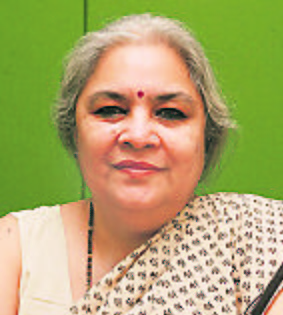
Photo for representation only. - File photo
Given the frightening situation regarding the surging pandemic, it is difficult to think or write of anything else. News comes daily about close family and friends who have been infected and their nightmarish experiences in locating a hospital bed, or even a clinic to get their Covid tests done. Worse, the mutant strains in this round sometimes evade the RT-PCR test, and only a CT scan at a later, more dangerous stage, when it has entered and harmed the lungs, is able to locate it. Others have complained of typhoid-like symptoms: all in all, the safest bet is to stay resolutely indoors and avoid all contact with other people. One wonders how effective the weekend lockdowns will be when the bhakts from the Kumbh and those from election rallies return to their villages. And the less said about our netas and their irresponsible behaviour, the better.
In contrast, look at the way the rest of the civilised world is handling this crisis. The state funeral for Prince Philip has been limited to just 30 persons who can attend the private ceremony inside the Windsor Castle. The British Prime Minister, sober after his close-death encounter with Covid, has decided to give up his place so that someone from the family can be accommodated. And in India? Our Prime Minister and his Home Minister, who should be at the forefront encouraging people to stay home, are openly exhorting them to come out and attend mega rallies, week after week in Bengal. Why does the Election Commission not step in and ban all rallies until the end of the month? In the eyes of the common citizen, all political leaders have lost the respect they had. One party or the other will win this election but the country, and certainly Bengal, will be the real loser.
That said, let us turn to more pleasant topics. These days, when digital media is our only means of listening to sober panel discussions and interviews, I chanced upon an interview conducted by Karan Thapar with Sanjaya Baru, whose latest book is just out. Titled ‘India’s Power Elite: Caste, Class and Cultural Revolution’, it is an interesting analysis of the rise of a new power elite that is radically different from the ancient regime. Behind the rise of this new class of power wielders is the story of India’s resolute shift from the cosy club that had thus far run the country to the mofussil lads, who studied in vernacular schools and are more comfortable in their own languages than in the Queen’s English. Until the rise of Modi and his team, no matter which party won, the power behind the institutions was firmly in the hands of an entrenched elite that had been to the posh public schools, elite Indian colleges or foreign universities and who, more often than not, came from distinguished families. So whether they ran the PMO, the powerful ministries in North and South Block or whether they headed our best academic institutions and think tanks, the more things changed, the more they remained the same. All of the old elite spoke flawless English and were completely at home eating with forks and knives in exclusive clubs such as the Gymkhana or the India International Centre. Those of you who remember the brilliant BBC series, Yes Minister and Yes Prime Minister, will recall Sir Humphrey, the suave Cabinet Secretary, who ran rings round his boss, a provincial politician.
The huge tectonic shift that Modi has brought, says Baru, is to induct the small-town boys and give confidence to those who suffered from a crippling lack of self-esteem because they were unable to match up to the bully boys of the Harvard and Oxbridge gang. It does not take a Freud to discover that Modi’s pride in speaking in Hindi is also an act of thumbing his nose at all those who must have humiliated him for a lack of English. The witch-hunting of the so-called Lutyen’s gang and their total emasculation stems from Modi’s firm belief that those who have never suffered from a lack will never understand the aspirations of a rising middle class. Moreover, the effete sons and daughters of the entitled and privileged class have nothing to offer India’s new middle class. Similarly, the Brahmins and upper castes who had ruled right up to the time of Vajpayee have been given the heave-ho, and in their place are those who are eager to work if given the opportunity.
This may seem like a simplistic and facile reading of the new power elite but reflect on programmes such as Indian Idol and SaReGaMaPa and the enormous success they have among viewers. Apart from locating new talent, they have encouraged all those young people who have enormous talent but little opportunity to shine. Those who could only dream of fame and recognition now find an environment that does not hold their humble education and background against them. Our cricket team is another good example of new discoveries that have taken our national team to unforeseen heights. The playing fields of public schools no longer matter. The result is that every small-town boy dreams of becoming a Dhoni or a Rishabh Pant one day. And why not?
Call this a widening of our democratic base or its nemesis; we can no longer ignore its impact.
Join Whatsapp Channel of The Tribune for latest updates.




























